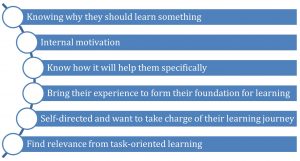Section 2.3: Different Adult Learning Theories
Alexandra Kerr; Chelsea McMullen; and Natasha Mehay
Discover Your Learning Style
First, let’s assess your learning style so you are better able to apply the adult learning theories to your own results. Click on the link below to take the following quiz to find out your learning style.
| There are three learning styles: | ||
| Auditory | Visual | Tactical |
To find out more about your learning style, visit here.
Now that you have an idea of your preferred learning style, we will assess the main adult learning theories.
Andragogy
Andragogy is the art and science of helping adults learn in it was popularized in 1980 by Malcolm Knowles (Western Governors University, 2020). The theory is based on the notion that adults learn very differently from children, and that they need different things.
To effectively learn, adult learners must:
- Know why they need to learn something
- Have internal motivation
- Know how it will help them specifically
- Build on their experience is a foundation for learning
- Be self-directed and take charge of their learning journey
- Find relevance from task-oriented learning

The core of andragogy revolves around the fact that adult learners must want to learn and know how it will help them succeed in their lives. By focusing on hands-on experience and giving adults autonomy to go through materials on their own, using andragogy as a teaching model helps them continue their education (Western Governors University, 2020).
Transformative Learning
As people grow and engage in new experiences, there can sometimes be “aha!” moments that completely change their perspectives (Gutierrez, 2020). This is known as transformative learning. Developed in the 1970s by Jack Mezirow, transformative learning theory is centred on changing the way learners think about the world around them, and how they think about themselves (Western Governors University, 2020).
There are three stages of transformative learning:
Identification of a Dilemma or Crisis
- This requires understanding that we do not know everything and may be wrong in our assumptions
- These crisis moments can cause learners to look for more information and learn something new
Establishment of Personal Relevance
- Learners ask, “What’s in it for me?” and “How does this apply to me?”
Critical Thinking
- Learners will need to evaluate their beliefs and values
These moments of transformative learning shape adult learners and help them along in their learning journey to improve in their personal or professional life.
Self-directed Learning
Self-directed learning became a formal theory in the 1970s with Alan Tough (Western Governors University, 2020) after having been in practice for hundreds of years. This adult learning theory is based on the learners’ ability to plan, implement and evaluate their own learning (Western Governors University, 2020). Self-directed learning is preferable for adult learners as they are often excited about their education and feel confident in their ability to take it on themselves (Western Governors University, 2020). This way of learning can be easily implemented in the workplace as a professional development tool. Adult learners are usually excited about something that will enhance their career.
Experiential Learning
Experiential learning theory was promoted by David Kolb in the 1970s. It focusses on the idea that adults are shaped by their experiences, and that the best learning comes from making sense of your experiences (Western Governors University, 2020). A hands-on learning experience enables adult learners to utilize this theory and learn by doing, instead of just hearing or reading about something (Western Governors University, 2020).
Experiential learning takes place in four stages:
| Concrete Experience | Experiences that leave a lasting impression |
| Reflective Observation | Reflect on their experiences |
| Abstract Conceptualization | Use critical thinking to be able to formulate concepts |
| Active Experimentation | Experiment through role-play to learn by doing |
(Table adopted from Gutierrez, 2020)
Project-based Learning
John Dewey promoted project-based learning theory as early as 1900 as a learning by doing method (Western Governors University, 2020). By focusing on scenarios from the “real world”, adult learners are able to learn through action. Projects can be chosen by the learners, so they are interested and invested in what they are doing (Western Governors University, 2020). This learning theory allows adult learners to apply their experience and knowledge to a project they are directing.

